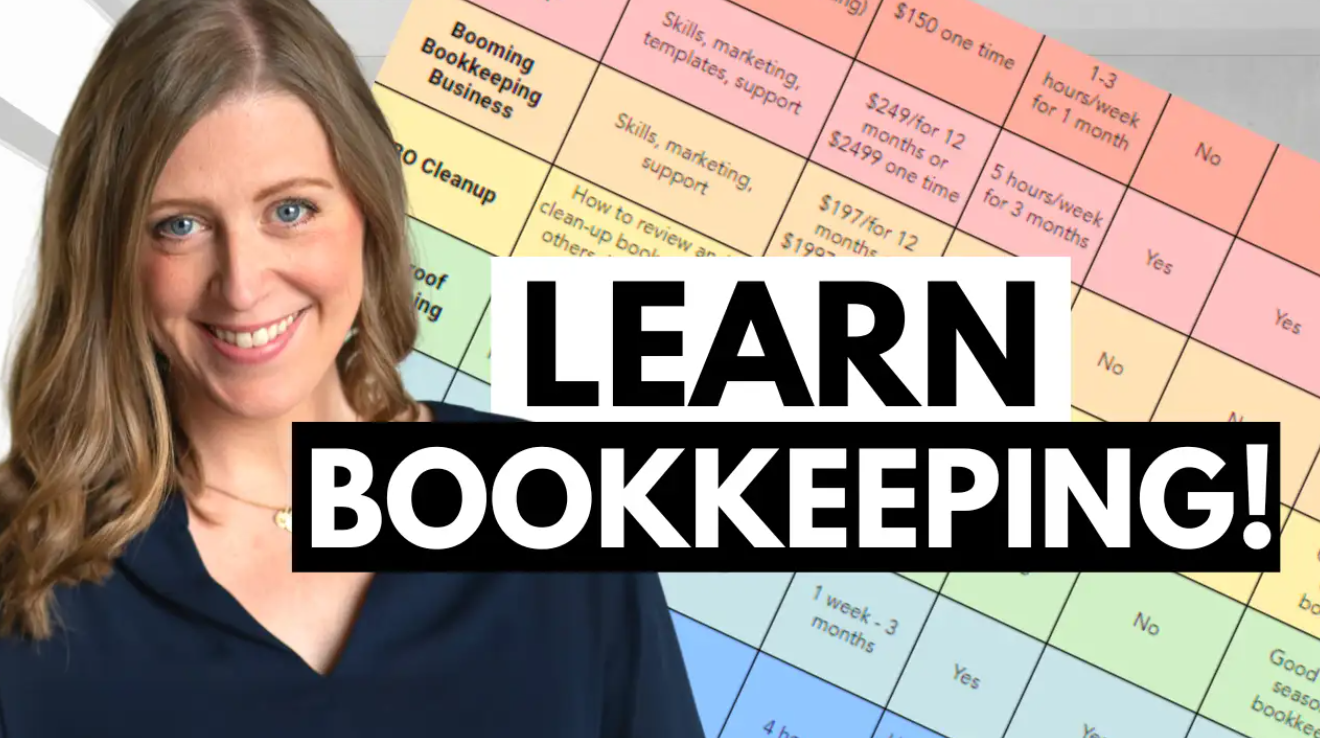Should I Start a Bookkeeping Business? The Future of Bookkeeping and A.I.
If you have been paying attention to the advancements in artificial intelligence, you might be wondering what this means for bookkeepers.
Will AI take over our jobs? Is bookkeeping as a profession at risk? I get these questions a lot, and it’s understandable. Technology is progressing quickly, and it’s natural to feel a little uncertain about what the future holds.
But before you panic, let’s take a step back and look at history. We’ll see that technology has always changed the workforce. And every time, people have found ways to adapt and thrive.
In this post, I’ll explain why AI won’t replace bookkeepers and how AI can help you in your bookkeeping business.
Watch the video here, or keep reading!
Technology Is Always Changing Bookkeeping
Some of you may be able to think back to when Excel first came out. There were headlines saying it would replace bookkeepers. Instead, it became a tool that made bookkeepers’ jobs easier. The same thing happened with QuickBooks, online banking, and cloud-based bookkeeping.
Yes, artificial intelligence will change bookkeeping, but change doesn’t have to mean elimination. It often means improvement. The transition won’t happen overnight, so you’ll have time to adapt just like bookkeepers did when we moved from paper ledgers to QuickBooks Online.
Change can be scary, but it also presents opportunities.
RELATED VIDEO: How Bookkeeping has Changed (and why you should care)
Bookkeepers Need a Mindset of Continuous Learning
One of the most important qualities of a successful bookkeeper is a willingness to keep learning.
In my 10+ years as a bookkeeper, I’ve had to adapt to bank feeds, new client communication methods, and changes in QuickBooks Online. If you find yourself stressed out about technology changes, bookkeeping might not be the best fit for you.
Some bookkeepers resisted cloud-based bookkeeping (such as QBO), and many got left behind. Those who adapted? They stayed in the game and were even able to grow their businesses.
The same will be true with AI. If you’re open to learning, you’ll find ways to use AI to your advantage.
FREE DOWNLOAD: Bookkeeper Classes and Certifications Chart
Will AI Reduce the Number of Bookkeepers?
Since artificial intelligence is making bookkeeping tasks faster and more efficient, you might be wondering if that means fewer bookkeepers will be needed overall.
However, all this means is, you’ll be able to complete more tasks in less time, which could allow you to increase the number of clients you serve. Let’s say you currently handle 10 clients part-time. If AI tools speed up your workflow, you might be able to handle 15 or even 20 clients in the same amount of time.
And here’s an important point: Faster work doesn’t mean lower rates.
Think about plumbers—you don’t pay them based on how many hours it takes to fix your sink. You pay for the value of the service. The same is true for bookkeeping. Even if AI helps you work faster, the value you provide to your clients remains the same. That’s why value pricing is key!
Bookkeepers who stay engaged, keep learning, and provide real value will continue to thrive.
RELATED VIDEO: Is Bookkeeping Dying? AI & Botkeepers - my thoughts
AI Will Enhance (not replace) Your Bookkeeping Services
Instead of viewing AI as competition, think of it as a tool that makes your job easier. AI can help improve accuracy, speed up transaction categorization, and reduce manual data entry.
If you’ve been bookkeeping for a while, you’ve probably already seen these changes happening in QuickBooks Online. Invoices are processed faster, transactions are categorized more accurately, and payroll is streamlined.
But here’s the thing: AI still needs a human to check its work. Just like bookkeeping software didn’t eliminate the need for bookkeepers, AI won’t either. Instead, it will free you up to focus on projects that truly make a difference for your clients.
Many business owners will still want a real person they can call when they have questions. They want someone who can check for errors, verify the accuracy of reports, and provide personalized insights. And most importantly, you, the bookkeeper, are the one who can provide this for them, not AI.
RELATED VIDEO: Can ChatGPT Do Bookkeeping?
The Shift to an Advisory Role in Bookkeeping
With artificial intelligence handling more routine tasks, bookkeepers have the opportunity to step into a more advisory role. AI can process data, but it takes a human to analyze it in a meaningful way.
You might notice inefficiencies in your client’s expenses, spot trends in their accounts receivable, or identify areas where they could cut costs. AI can assist in pulling the data, but you are the one who brings insight and creativity to problem-solving.
For example, let’s say AI generates a report showing that a client’s unpaid invoices spike every July. AI won’t know why, but you might realize that it’s because their customers are on vacation during the summer. You could then advise your client to send payment reminders earlier or adjust their invoicing strategy.
These types of insights make bookkeepers invaluable!
FREE DOWNLOAD: Start a Bookkeeping Business Checklist
Final Thoughts on Bookkeepers and Artificial Intelligence
The future of bookkeeping is changing, but it’s not disappearing. AI will streamline many tasks, allowing bookkeepers to work more efficiently and provide even greater value to clients. Those who embrace new technology and continuously adapt will find themselves in a strong position moving forward.
If you’re feeling overwhelmed by AI, you’re not alone! The key is to start small—explore how AI can help you rather than fearing it. And if you’re looking for more guidance, check out my free masterclass on how I got my first bookkeeping clients.
So, what do you think? Are you excited about AI, or does it feel overwhelming? Let me know in the comments!
Let’s embrace the future of bookkeeping together!
Do you want monthly tips to grow your bookkeeping business?
Join the FinePoints Newsletter






